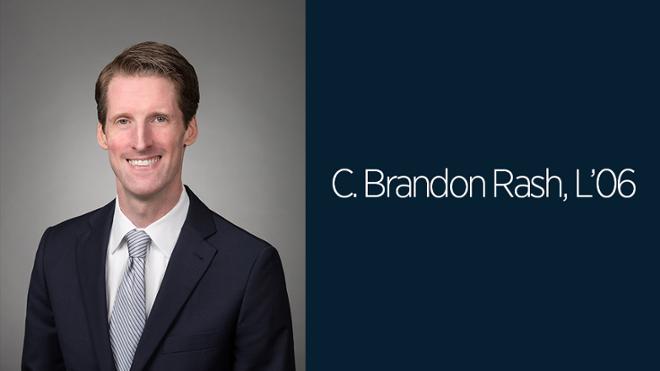Spider Spotlight: C. Brandon Rash, L'06
His Law School Experience
With a background in electrical engineering, Brandon Rash worked for a semiconductor company for four years before deciding to pursue a law degree. “I did go and talk to a patent attorney [before applying to law school],” said Rash. “But his advice was not to go into patent law!”
Rash came into law school with an open mind – but the intellectual property field proved to be a natural fit: “Patent law is a great field for engineers and scientists because it combines the law and technology,” said Rash. A technological background is almost a requirement for a patent attorney, he explained, because of the close level of work with inventors. “You need to be able to talk their talk, understand what they’re doing,” said Rash.
Excited about the opportunity to put his technical knowledge to use in a new way, Rash enrolled in Richmond Law in 2003, when the intellectual property curriculum and programming were not as robust as today. In fact, during his time as a student, Rash co-founded the Student Intellectual Property Law Association with fellow student Joshua Brady, L’06. Rash also spent time as a summer associate at two law firms, confirming his passion for the patent field.
His Career Path
After a one-year clerkship with the U.S. District Court of the Eastern District of Virginia, Rash knew that he was drawn to the litigation side of patent work. He landed at the boutique IP firm of Finnegan in Washington, D.C., where his work focused on litigation in federal district courts and at the International Trade Commission. After 12 years at Finnegan, Rash is now a partner at Akin Gump, in Washington, D.C.
Throughout his career, Rash has worked with clients on technologies ranging from LED lighting to jet engines to wireless technology. It’s that innovative side of the industry that attracted Rash in the first place. “The whole purpose behind the patent system is to promote innovation,” explained Rash.
His Advice for Students
When it comes to starting a career in the patent field, experience is key, said Rash – and there’s no shortage of good opportunities. “There are traditional summer associate opportunities at bigger firms, but there are also opportunities at small firms looking for interns, or at the patent office, or with companies looking for patent support,” he added. “Basically anything that [students] can do to get exposure to patents and patent prosecution or litigation – all of that is good experience.”
